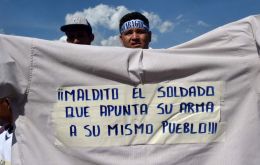MercoPress. South Atlantic News Agency
Tag: Social Security
-
Thursday, March 23rd 2023 - 10:55 UTC
Uruguayans go on strike against social security reforms

Uruguayans were preparing for a disruptive Thursday as unions and other groups are to stage nationwide strikes to protest against President Luis Lacalle Pou's initiative to make adjustments to the pension system and increase the retirement age despite his campaign promises otherwise.
-
Thursday, December 29th 2022 - 10:52 UTC
Uruguayan Senate passes social security reform on to Lower House

Uruguay's Senate Wednesday approved each article in particular of the social security reform bill, which will now go to the Lower House for further deliberation.
-
Wednesday, December 28th 2022 - 19:33 UTC
Uruguay: Senate agreed in general to social security reform

Uruguay's Senate Tuesday issued a broad approval to the social security reform bill, leaving the details to be reviewed Wednesday, it was reported in Montevideo.
-
Tuesday, April 30th 2019 - 09:58 UTC
Brazil's central government finances tend to improve

Brazil’s central government’s primary budget deficit narrowed in March thanks to aggressive cuts in discretionary spending, the Treasury said on Monday, although it warned that public finances were still at risk from pension commitments and weak revenues.
-
Wednesday, April 25th 2018 - 15:17 UTC
Repression and protests in Nicaragua do not mitigate: Daniel Ortega as Nicolás Maduro?

“Ortega and Somoza are the same thing” protesters in Nicaragua yelled last week against the government of Daniel Ortega, after the announcement of a Social Security's reform that unleashed a wave of protests marked by repression and excessive use of force by the authorities. Human rights organizations have announced that at least 30 people have died in the demonstrations, including students, police and a journalist. This surprise wave of civil protests suggests comparing the crisis in the Central American country with the lived in the Venezuela of Hugo Chávez and Nicolás Maduro for years.
-
Thursday, July 19th 2012 - 20:50 UTC
Argentines main concern insecurity, but also greater satisfaction with democracy

The main concern of Argentines is insecurity, followed at a distance by poverty according to a public opinion poll released this week in Buenos Aires, which also revealed that one out of three interviewed had been victims of some kind of criminal activity.
-
Tuesday, August 31st 2010 - 03:40 UTC
Uruguay government employees’ take-home pay doubles that of the private sector

Uruguayan government employees’ take-home pay on average more than doubles their counterparts in the private sector according to official figures from the country’s Social Security Office and published by Montevideo’s main daily El País.
-
Saturday, July 10th 2010 - 07:41 UTC
US no longer world’s great consumer; needs to target sustainable debt, says IMF

The US economy is recovering after the global economic crisis, but consumers and financial institutions remain cautious as weak housing markets, high unemployment, and risks in Europe remain a concern, the IMF staff said in a press conference that followed its annual review of the world’s largest economy.
